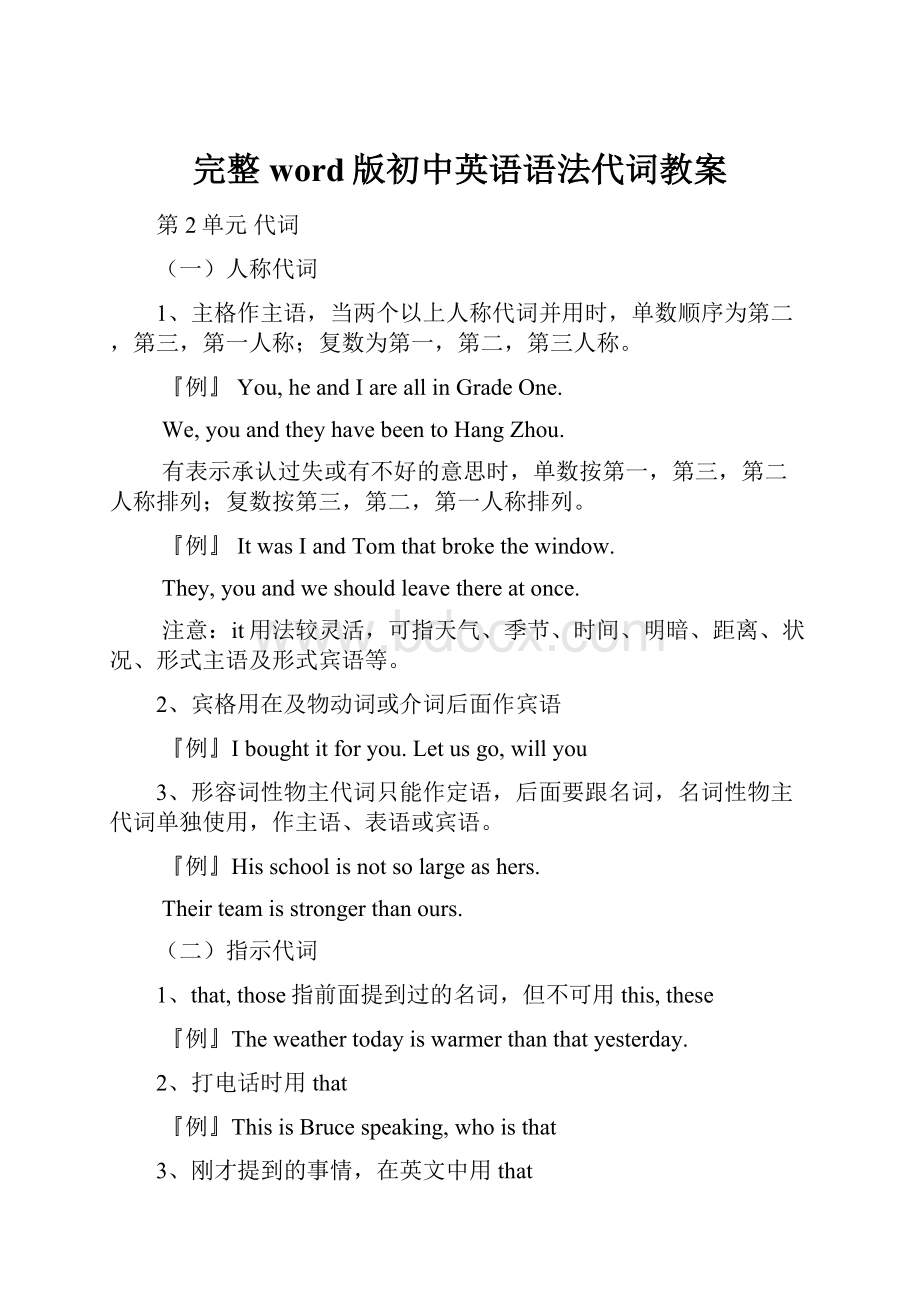完整word版初中英语语法代词教案.docx
《完整word版初中英语语法代词教案.docx》由会员分享,可在线阅读,更多相关《完整word版初中英语语法代词教案.docx(6页珍藏版)》请在冰豆网上搜索。

完整word版初中英语语法代词教案
第2单元代词
(一)人称代词
1、主格作主语,当两个以上人称代词并用时,单数顺序为第二,第三,第一人称;复数为第一,第二,第三人称。
『例』You,heandIareallinGradeOne.
We,youandtheyhavebeentoHangZhou.
有表示承认过失或有不好的意思时,单数按第一,第三,第二人称排列;复数按第三,第二,第一人称排列。
『例』ItwasIandTomthatbrokethewindow.
They,youandweshouldleavethereatonce.
注意:
it用法较灵活,可指天气、季节、时间、明暗、距离、状况、形式主语及形式宾语等。
2、宾格用在及物动词或介词后面作宾语
『例』Iboughtitforyou.Letusgo,willyou
3、形容词性物主代词只能作定语,后面要跟名词,名词性物主代词单独使用,作主语、表语或宾语。
『例』Hisschoolisnotsolargeashers.
Theirteamisstrongerthanours.
(二)指示代词
1、that,those指前面提到过的名词,但不可用this,these
『例』Theweathertodayiswarmerthanthatyesterday.
2、打电话时用that
『例』ThisisBrucespeaking,whoisthat
3、刚才提到的事情,在英文中用that
『例』Hewasillyesterday.I’msorrytohearthat.
4、this,these指在方位上较近的人或物that,those指在方位上较远的人或物
有关词组及应用
『例』Thisismyshirt,that’syours.
『例』TheseTVsaremadeinChina,thosearemadeinJapan.
(三)反身代词:
主要用于加强语气
单数myselfyourselfhimselfherselfitself
复数ourselvesyourselvesthemselves
反身代词有以下常见搭配
enjoyoneself=haveagoodtime
byoneself=alone
helponeselfto…
learnsth.byoneself =teachoneselfsth.
helpyourselvesto…
『例』:
Imyselfdidit(Ididitmyself).
Shecan'tdressherself.
(四)不定代词:
不是指明代替特定名词(或形容词)的代词
如:
all,each,every,both,either,neithernone,one,little,few,many,much,other,another,some,any,no以及由some,any,no,every等构成的合成代词
1、it与one的区别
『例』Ihaveanicewatch.Doyoulikeit(thematch)
Ihaveanicewatch.Wouldyouliketobuyone(awatch)
2、every与each的区别
every+单数名词,表示“每一个”,强调共性、整体,只作定语,形式上为单数.不与of连用;each表示“每一个”,强调个性,作定语主语、宾语和同位语,常与of连用。
『例』EveryoneofusisfondofEnglish.(全体)
Everychildlikesplayinggames.(全体)
Weeachhaveabike.(个别)
Eachofthemhasaniceskirt.(个别)
3、everyone,noone与everyone,none
everyone,noone,只能指人,不能指物,不能和of短语连用,everyone,none,既可指人,也可指物,可与of短语连用。
『例』Iseveryoneheretoday!
Noonetoldusthatwhowasn'tthere.
Noneofyouwatchedcarefullyenough.
4、another与other的区别
Another:
泛指三个或三个以上中的另一个
『例』Thisisnotgoodenough,showmeanother,please.
Idon’twantthiscoat.Pleaseshowmeanother.
other:
后面接名词,泛指别的、其他的
『例』Doyouhaveanyotherquestions
theother:
1.特指两个中的另一个
『例』Hehastwosons.Oneisaworker,theotherisadoctor.
2.修饰名词,特指另一个、另一些
『例』Tomlikesswimming,andtheotherboysinhisclasslikeswimming,too.
Others:
泛指其他的人或物
『例』1)Heoftenhelpsothers.
2)Someareplayingbasketball,othersareplayingfootball.
theothers:
特指确定范围内剩下的全部人或物
『例』1)Therearefiftystudentsinourclass.
2)Twentyofthemaregirls,theothersareboys.
one...theother…:
一个…,另一个…,表示两个当中另一个
『例』Thisisnotgoodenough,showmeanother,please.
『例』Ihavetwodaughters,oneismarriedandtheotherisacollegestudent.
5、some一般用于肯定句中,any用于疑问句,否定句和条件句中,但有些问句表示请求、建议或希望得到肯定答复时,仍用some,any还可表示“任何的”意思。
some用于肯定句中的情况
『例』Therearesomeflowersinfrontofthehouse.
any用于疑问句和否定句中的情况
『例』Doyouhaveanypicture-books
Sheisyoungerthananyotherstudentinherclass.
注意:
some有时也可用于表示请求、征求意见的疑问句中
『例』1)Wouldyoulikesomemeat你想要些肉吗
2)MayIasksomequestions我可以问问题吗
3)CouldIhavesomeapples我可以吃苹果吗
4)Whydidn'tyoubuysomebananas为什么你不买些香蕉呢
6、both表示两者都,而all表示三者或三者以上,both和all用于助动词之后,实义动词之前:
『例』Myparentsarebothteachers.=Bothofmyparentsareteachers.
BothJimandTomarestudents.
WeareallfromCanada.=AllofusarefromCanada.
TheyallcomefromAustralia.
7、either(两者任一)与neither(两者无一),eitherof,neitherof后谓语动词常用单数形式
either“两者中任何一个”,作主语时谓语用第三人称单数;作定语时后跟名词单数
『例』Therearetreesoneithersideofthestreet.=Therearetreesonbothsidesofthestreet.
Doyouknoweitherofthetwoladies
neither“(两者)都不”,含有否定意义,作主语时谓语用第三人称单数;作定语时后跟名词单数
『例』Neitheranswerisright.
-Arethetwoanswerscorrect
-No,neitheriscorrect.
8、any(三者以上任一)与none(三者以上无一),相当于notany
『例』Youcanchooseanyofthethreeonthetable.
Aswewereasleep,noneofusheardthesound.
9、many,much,few,afew,little,alittle
many,few,afew修饰可数名词
much,little,alittle修饰不可数名词
afew与alittle表示肯定
few与little表示否定
『例』CouldIhaveafewwordswithyou
Ihavefewfriendsexceptyou.
Hurryup,thereislittletimeleft.
Theywentonwiththeirworkafteralittlerest.
(五)物主代词:
形容词性物主代词和名词性物主代词的关系
1.形容词性物主代词+名词=名词性物主代词
注意:
名词性物主代词在句中所指代的关系是单数还是复数。
『例』1)Thesebooksaren'tours.Oursarenew.(ourbooks=ours)
2)Thisisnotourroom.Oursisoverthere.(ourroom=ours)
2.“of+名词性物主代词”表示所属
『例』Tomisafriendofmine汤姆是我的一个朋友